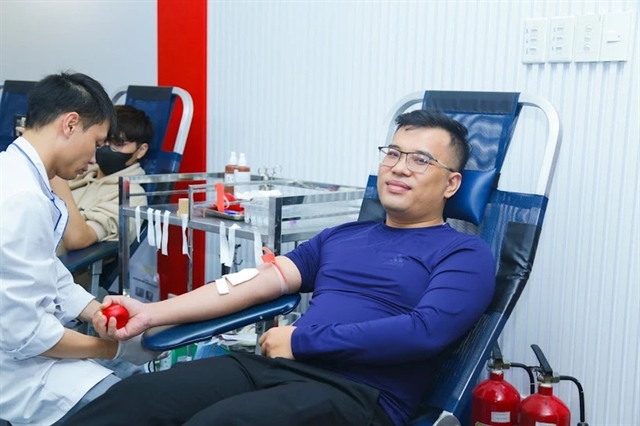 Society
Society

 |
| Volunteers donate blood at the blood donation event on December 17, 2023 in Hà Nội. — VNA/VNS Photo |
HÀ NỘI — Demand for blood and blood products for emergency treatment at hospitals in the north in 2023 has increased by about 10 per cent compared to the previous year. Particularly, the demand for rare blood products has experienced a significant surge, the Central Institute of Haematology and Blood Transfusion has announced.
In 2023, the institute has received an estimated figure of blood products for the year from hospitals, reaching up to 668 units of rare blood, including 414 units of red blood cells and 154 units of platelets. This quantity is nearly double that of 2022 and unprecedented compared to previous years, it said.
Dr Trần Ngọc Quế, the institute’s Director of the National Blood Centre, said the peak period was from after the Lunar New Year until mid-March this year. In just two months, the institute received a proposed figure of 180 units of rare blood and blood products, which was half that of the entire year 2022.
Meanwhile, the available quantity of rare blood could only satisfy 30 per cent of this need. The remaining amount had to be mobilised from blood donors. Especially, platelet products had a maximum storage duration of five days, so the institute could not stockpile them but must mobilise when there was a need.
Moreover, platelet donation required stricter criteria for weight, quantity and longer donation time, an average of 70-90 minutes per session, compared to about five minutes for blood donation. Therefore, ensuring a source of rare platelets was even more challenging, he said.
Quế shared that many donors with rare blood types had to travel long distances, willingly donating blood to help patients at any time.
For many, blood donation had become a regular and vital habit. The enthusiasm and readiness of blood donors had played a crucial role in ensuring the supply of this extremely special blood, he stressed.
According to the latest updated data by the International Blood Transfusion Society, there are up to 43 blood group systems with 376 different blood group antigens. The classification into different blood groups is based on the presence or absence of genetically inherited antigens on the surface of red blood cells.
The International Blood Transfusion Society defines a blood group antigen or type, referred to as a blood group, with a frequency of occurrence below 0.1 per cent as rare and below 0.01 per cent as very rare.
The occurrence frequency of blood groups and blood group types varies greatly among different races, regions and countries. The determination of the blood group ratios of the Vietnamese people was carried out quite early, revealing the main blood group ratios of the ABO blood group system and the Rh blood group system in some ethnic groups and communities in Việt Nam.
The results show that one of the rare blood groups commonly found in Việt Nam is Rh(D) negative, accounting for less than 0.1 per cent of the population. This rate in Europe, the US, and Australia is much higher, accounting for about 15-40 per cent of the population.
When there is an emergency case requiring rare blood, family members usually ask for blood on social media or directly call individuals with rare blood types, leading to misinformation and the spread of unverified information, according to Quế.
There have been cases where information was shared when the institute had already received blood from donors, he said. Therefore, the institute encouraged people not to post information about the need for rare blood on social media. — VNS